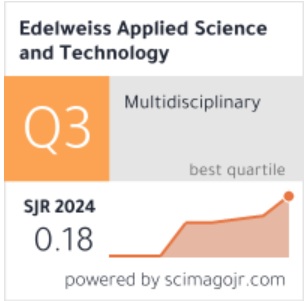All research articles submitted and accepted in 2026 will be eligible for a 100% waiver of APC if either the corresponding author or a co-author is recognized among the top 2% of most-cited scientists worldwide, according to the most recent Stanford/Elsevier citation database or a similarly recognized index.
Instructions for Authors
- Manuscript Originality
Authors must ensure that all submitted manuscripts are original and unpublished. Manuscripts that have been published elsewhere, in whole or in part, or are under consideration by another journal will not be accepted. Submissions should present novel findings that contribute meaningfully to the field of applied science and technology.
- Title Page Requirements
The title page must contain the full title of the manuscript, an abstract of no more than 250 words, and 3 to 6 relevant keywords. A separate author information page must list the full names, institutional affiliations, and complete contact details—including email addresses—of all contributing authors.
- Abstract
The abstract should concisely summarize the purpose, methodology, key results, and conclusions of the study. It should provide a clear overview of what the research has achieved. The abstract must be written in paragraph form and should range from 150 to 250 words. Avoid references and unexplained abbreviations. Any term to be abbreviated must be written in full on first use, followed by the abbreviation in parentheses.
- Abbreviations
All abbreviations must be spelled out when first introduced in the manuscript. The full term should be followed by the abbreviation in parentheses. Once defined, the abbreviation may be used consistently throughout the remainder of the text.
- Figures and Illustrations
All figures must be included within the main body of the manuscript text, positioned appropriately where they are first mentioned. Figures should be numbered consecutively (e.g., Figure 1, Figure 2), and each figure must include a clear and concise caption directly beneath it. Authors should ensure that all figures are of high resolution and suitable for publication.
- Tables
Tables should be numbered consecutively and provided with concise titles above each table. Unlike figures, tables should be inserted into the manuscript at their relevant positions within the text. Authors must ensure that tables do not duplicate data already presented in figures.
- Acknowledgements
Acknowledgements should be placed at the end of the manuscript, before the reference list. Authors may use this section to recognize funding sources, institutional support, or contributions from individuals who do not meet the criteria for authorship.
- References
All references must follow the IEEE citation style, using bracketed numerical in-text citations (e.g., [1], [2]–[4]). References must be listed at the end of the manuscript in the order they are cited in the text. Each reference should include the full and accurate bibliographic details as per IEEE format.
Every citation in the text must appear in the reference list and vice versa. Manuscripts that fail to comply with IEEE reference formatting may be returned for correction or rejected.
- Author Concentration Policy
To promote diversity in authorship and ensure broad academic representation, each author is limited to a maximum of five (5) publications per calendar year in Edelweiss Applied Science and Technology. Submissions exceeding this limit will not be considered for review or publication. (Updated 25 June, 2025)
- Policy on Self-Citations
The journal discourages unnecessary or excessive self-citations. Authors should only reference their previous work when it is directly relevant to the new manuscript. Manuscripts found to contain unsubstantiated or inappropriate self-citations may be rejected during editorial screening or peer review. (Updated 25 June, 2025)
- Open Access and Article Processing Charges
All articles published in Edelweiss Applied Science and Technology are made available through full open access. This means that accepted articles are freely accessible to readers worldwide without any subscription or access fees, ensuring maximum visibility and dissemination of the research.
To support the costs associated with open access publishing, authors are required to pay an Article Processing Charge (APC) of USD $1,250 upon acceptance of their manuscript. This fee covers the expenses related to the peer review process, professional copyediting, typesetting, online hosting, long-term digital archiving, and overall journal management.
Partial discounts on the APC may be granted to authors from Least Developed Countries (LDCs), as recognized by the United Nations, as well as to students who are able to demonstrate limited financial resources.
Further information about payment procedures and discount eligibility is available on the journal’s website or can be obtained by contacting the editorial team directly.






